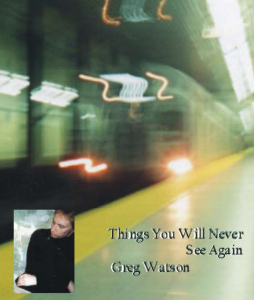Book Review: Greg Watson, “Things You Will Never See Again”
In the meditative season, mnartists is running extra book reviews. Head out to your neighborhood bookstore and grab these titles by Minnesota authors. Here's noted poet Connie Wanek on Greg Watson's "Things You Will Never See Again."

Things You Will Never See Again, a collection of poetry by St. Paul’s Greg Watson, is dedicated to the memory of Mark Allen Cole, and one cannot help but read the book through the lens of this dedication. Even the title suggests that the poems are a kind of report to his friend on how the world looks after his death.
But the work is not uniformly sad, by any means; nor are the poems “confessional” or filled with personal detail. Most of the work is brief and lyrical, with attention to sound and the natural image. Though the setting for most of the poems is urban, they are inhabited by sycamores, sparrows, elms, crows, fish, rivers and lakes—and the wind blows through them, and they are rain-washed. Watson evokes the natural landscape through lyrical metaphor, as in these first lines of “The Silence of City Streets”:
The silence of asphalt, like the silence
of large water, weighted with age
and expectation, bears the namesake of all
our departures…
Occasionally the lines relax into prose—the book begins with a prose poem—but mostly they are spare. Watson has enough confidence as a poet to allow a brief, but dense thought to stand as a very short poem, as in “Credo,” presented here in its entirety:
Never turn away from
a blessing
no matter how
severe.
As suggested by the quotation from the Dalai Lama which precedes the first poem, the theme in these pages is impermanence. Even a poem like “A Brief Encounter,” which turns on one of those small miracles of the imagination, shares this central notion. It’s a lovely poem, nine lines, swift and sure. Watson has a keen eye and ear: in “Sounds Heard During an Afternoon Storm in September” he says the shadows are “woolish” and the rain sounds “like a litter of cats/ lapping from the same milk bowl.”
Many of the poems work the way a Zen koan does, presenting a paradox or small riddle that must be solved, not through rational thought, but through acceptance and reconciliation of contradictory truths. One feels that the poet, too, is seeking as he writes, and that this process is more the point than any conclusion he may draw. Too, we find the impulse of the Buddhist toward humility: Watson says
Each time I re-write
my epitaph, it requires
fewer and fewer
words.
Occasionally a pair of adjectives or an adverb seems unnecessarily decorative, as here in “Monument”: “The thick and stately oak…casting small, bird-like shadows/ in the feminine, overgrown grass.” Part of this is writing style. But too many modifiers, rather than clarifying, can cloud a poem’s effect.
Overall, though, the poems are penetrating and rewarding. Things You Will Never See Again is Watson’s third book from March Street Press. In an era when readers’ patience is often tested by baggy narrative poetry, it’s refreshing to read poems that move directly toward an essential conclusion.